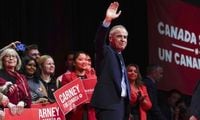In a significant political shift, the Canadian Liberal Party, led by economist Mark Carney, secured a hard-fought victory in the parliamentary elections held on April 28, 2025. This triumph comes against a backdrop of escalating tensions with the United States, particularly due to the controversial policies of U.S. President Donald Trump, who has threatened to impose high tariffs and suggested that Canada could become the 51st state.
Following a phone call on April 30, 2025, between President Trump and Prime Minister Carney, the two leaders acknowledged the importance of cooperation between the United States and Canada as independent, sovereign nations. This dialogue reflects a desire to mend relations strained by recent events, including Trump's aggressive rhetoric and trade policies.
During the elections, the Liberal Party garnered approximately 169 seats in the House of Commons, just shy of the 172 needed for a majority. The Conservative Party, led by Pierre Poilievre, managed to secure 144 seats, while the Quebec Bloc, advocating for Quebec's independence, captured about 23 seats. The results indicate a significant political landscape where the Liberals, despite previous predictions of defeat, have managed to maintain their position in power since 2015.
Mark Carney's campaign was notably shaped by the political climate influenced by Trump’s actions. Analysts suggest that the aggressive stance taken by Trump has galvanized Canadian voters, prompting them to rally behind Carney as a counterforce. In his victory speech, Carney emphasized the need to unite Canadians, stating, "Let’s put an end to the division and anger of the past. We are all Canadians, and my government will work for all and with all.”
Carney, who has an extensive background in economics, having previously served as the head of the Bank of Canada and the Bank of England, positioned himself as a stabilizing figure amid fears of a deteriorating relationship with the U.S. His campaign focused on protecting Canada's economic sovereignty and combating the retaliatory tariffs imposed by the Trump administration. He asserted, "We will fight back against Trump's retaliatory tariffs. In fact, we are already fighting them with our own retaliatory tariffs, which inflict maximum damage on the United States with minimal impact here in Canada.”
As Carney prepares to govern, he faces the daunting task of addressing the division within Canadian society that these elections have exposed. The results highlighted a significant geographical and demographic split, particularly in Alberta and Saskatchewan, where the Liberals faced strong opposition. These provinces have long harbored feelings of alienation toward the federal government in Ottawa, raising concerns about national unity.
Political experts note that while Carney's victory is a testament to his leadership, the challenges ahead are formidable. The Liberal Party will need to navigate complex issues, including rising housing costs, economic stagnation, and high unemployment rates that have plagued Canada in recent years. The economic policy landscape will require careful negotiation with the U.S. to avoid further escalation of trade tensions.
In the wake of the elections, Carney's commitment to fostering stronger ties with reliable international partners, particularly in Europe, signals a strategic pivot for Canada. He aims to strengthen economic cooperation and explore new trade agreements, distancing Canada from the tumultuous relationship with the U.S. under Trump’s administration.
The outcome of the elections has also raised questions about the future of the Conservative Party. Pierre Poilievre's focus on domestic issues such as rising prices and the housing crisis resonated with many voters, especially younger Canadians. However, his party's inability to secure a majority has sparked discussions about leadership and direction moving forward.
As the dust settles from the elections, the implications of Carney's victory extend beyond Canada’s borders. The shift in leadership presents an opportunity for Canada to redefine its role on the global stage, particularly in light of increasing protectionist sentiments in the U.S. The Liberal Party's success may also embolden other democratic nations to strengthen alliances and counter the rise of populism.
In conclusion, while the Liberal Party's victory marks a significant moment in Canadian politics, it also highlights the complex interplay of domestic and international factors that will shape Carney's tenure as Prime Minister. The path ahead will require deft political maneuvering and a commitment to addressing the diverse needs of Canadians, especially in a landscape increasingly defined by external pressures and internal divisions.






